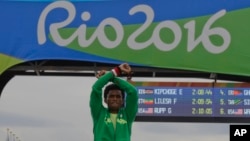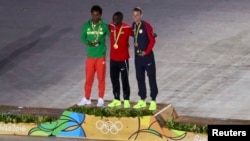As Ethiopian runner Fayisa Lilesa reached the finish line of the Olympic men's marathon Sunday, he crossed his clenched fists above his head, making an "X" symbol in support of anti-government protests in his home Oromia region.
Lilesa, who won the silver medal in the event, has told VOA that he now fears going back to Ethiopia, although a government spokesman says he will be welcomed if he does.
"They are like mad dogs, things they are [doing] are like mad dogs," Fayisa said, referring to Ethiopian officials. "They might kill me, they might arrest me. They might bar [me] from leaving the country. So many of us are muffled and people are struggling to breathe a sign of a relief."
Oromia has seen recurring protests for 10 months, since the government announced and then withdrew plans to annex land from the region into the capital, Addis Ababa. Similar anti-government protests have taken place in the Ahmara region. Human Rights Watch says hundreds have died in clashes with police.
Lilesa spoke with Sora Halake of VOA's Horn of Africa Service by phone Sunday while remaining at the Olympic athletes' village in Rio de Janiero. He said he might try to stay in Brazil or seek asylum in the United States or Italy.
Ethiopia's information minister Getachew Reta told a state-affiliated broadcaster that if Lilesa does come home, he will not face prosecution.
Lilesa will "not face any problems for his political stance," Reta told the Fana Broadcasting Corporation. "After all, this is an athlete who secured a silver medal for his country."
'Mixed emotions' at medal
Lilesa, 26, is no stranger to world stages. He has run marathons all over the world, and his personal record of two hours, four minutes and 52 seconds in Chicago in 2012 ranks among the top ten fastest marathon times ever.
This was his first Olympics and one of his strongest performances. But he said he crossed the finish line Sunday with mixed emotions.
"There is no happiness, that victory didn't make me happy," he said. "I couldn't express my happiness as some of my friends are in prison, so many of them dead. My happiness is changed to grief."
He said he decided to flash the "X" symbol as a sign of solidarity "with my people dying at home." Lilesa is a native of Jaldu, a small town in the Western Shewa part of Oromia.
"The sign represents resistance, protest that Oromo have been showing,” he said. “I showed it because I am Oromo, too. I did this to show solidarity with them as much as I can and much as I am able."
His display at the finish line was not the first time he made the symbol. "I showed the sign at the beginning of the race,” he said. “I think the camera didn't notice that and I wanted to repeat at the finish line."
Lilesa was not the first to use the world's biggest athletic stage to send a political message. Some compared his gesture to what African-American sprinters Tommie Smith and John Carlos did at the 1968 Olympics in Mexico City when they raised their clenched fists on the podium wearing black gloves in solidarity with the Black Power movement.
Some have also suggested that the gesture violates the Olympic Charter which bans any "kind of demonstration or political, religious or racial propaganda" inside Olympic competition sites. Smith and Carlos were suspended for their gesture, but Lilesa received his medal without incident.
Soon after Sunday's race, Ethiopia's information minister called Lilesa a hero and made no mention of his protest in a congratulatory tweet to Ethiopian athletes.
Lilesa isn't the first Ethiopian athlete to consider seeking protection due to political issues. One of the athletes competing in Rio as a non-state refugee, Yonas Kinde, a marathoner who also hails from Ethiopia, has asked for help. He says that going back to Ethiopia would be dangerous and fears for his life.
Another four Ethiopian athletes defected after traveling to participate in the 2014 World Junior Championships in Eugene, Oregon, and sought asylum.





